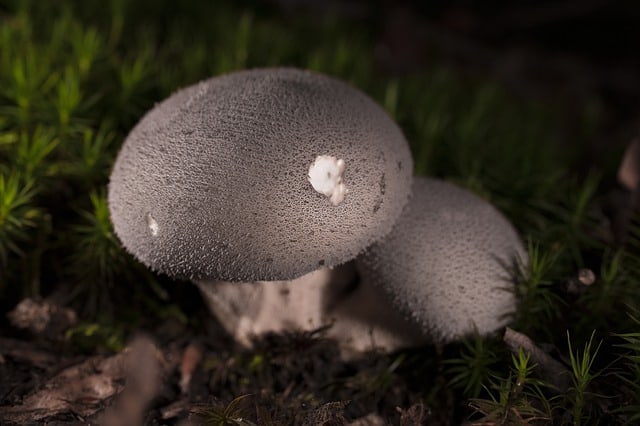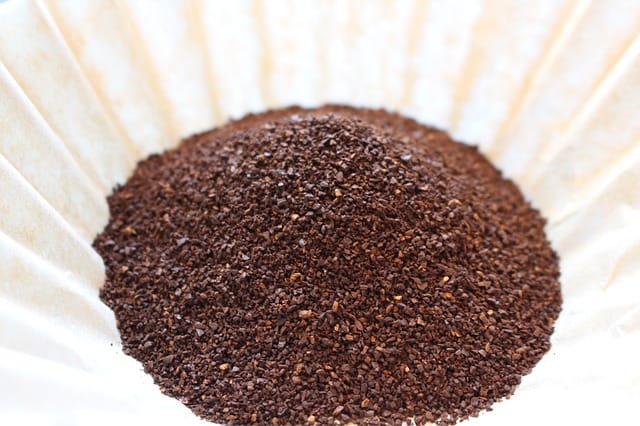Wild mushrooms are toxic to dogs. Dogs can eat a variety of regular store-bought mushrooms but they should not consume any mushrooms growing wildly in your yard.
If your dog eats a mushroom growing randomly in the grass, it could be lethal or at least make them very sick.
Wild mushrooms have no quality standard controls so you cannot know what they contain. If it contains high amounts of toxic substances, it can be fatal for your dog.
Are The White Mushrooms In My Yard Poisonous to Dogs?
White mushrooms, also known as Fairy Ring mushrooms, are not poisonous. These mushrooms do have a bad smell which gives them a bad reputation as many people assume they are poisonous because of their foul odor.
This bright white, non-poisonous mushroom is called Amanita Thiersii. It is often seen in large areas, wooded areas, and grass areas.
Are All Mushrooms That Grow in Your Yard Poisonous to Dogs?
No, not all wild mushrooms that are growing in your yard are poisonous to dogs, but because the mushrooms in your yard are largely unknown, it is an unnecessary risk to take.
The mushrooms that grow in your yard probably are not poisonous to touch but once consumed they can have negative health effects.
Therefore, unless you are a mushroom expert, letting your dog eat mushrooms in your yard is like playing Russian Roulette with their health.
Is it OK for My Dog to Touch Mushrooms?
Touching some poisonous mushrooms can have terrible health consequences for dogs, but mushrooms commonly found in yards tend to be safe to touch.
The reason why a mushroom is poisonous is the number of toxins it contains. Some mushrooms contain a lot of toxins that can extend to the surface areas, while others may contain small amounts, or the toxins only reside inside the mushroom.
What Happens If My Dog Sniffs a Poisonous Mushroom?
If your dog smells or sniffs a poisonous mushroom, they may suffer from inflamed nasal passages and very toxic mushrooms can induce nausea, vomiting, stomach cramps, and diarrhea if sniffed and licked excessively.
If your dog sniffs and licks (which are often a combined behavior in dogs) a poisonous mushroom then take them to your vet immediately.
Can Dogs Eat Mushrooms?
It’s okay for your dog to eat mushrooms sold in grocery stores that we humans eat. Mushrooms are a complex species, and many are completely harmless and are a common household ingredient.
However, some people do suffer from mushroom sensitivity, and like humans, dogs can also be sensitive to some of the nutrients found in mushrooms.
Since the mushrooms you buy from the markets do not contain toxins or have been precooked which removes all traces of harmful poisons, then they are fine for your dog to eat. For this reason, you can give these types of mushrooms to your dog with peace of mind.
What Kinds of Wild Mushrooms Are Toxic to Dogs?
Most of the mushroom species on earth are non-toxic, but the remaining small fraction is deadly poisonous.
It is very difficult to distinguish a poisonous mushroom from a non-poisonous mushroom because of their similarities, so unless you are 100% sure do not give your dog a mushroom, and do not consume it yourself.
Dogs have a special interest in some types of mushrooms, especially Amanita Phalloides (Death Cap) and Inocybe spp. Some of these types of poisonous mushrooms have a fishy odor that draws the attention of dogs.
In addition, other types of mushrooms that are poisonous are as follows:
- Amanita Phalloides, popularly known as the “Hat of Heath”
- Galerina Marginata, known as “Deadly Galerina” or “Galerina Autumnalis”
- Amanita Gemmata or “Jeweled Hat of death”
- Amanita Muscaria, also called “Amanita Agaric” or “Deadly Agaric”
- Gyromitra spp. or fake morel
- Inocybe spp. and Clitocybe Dealbata mushrooms
What Are the Symptoms of Mushroom Poisoning in Dogs?
Mushroom poisoning symptoms differ depending on the type of mushroom. For example, the Amanita mushroom contains an amanitin toxin. This poison causes liver failure and acute kidney damage in your dog.
Inocybe spp and Clitocybe Dealbata mushrooms cause disorders in the urinary tract and neurological nervous system.
In mushroom poisoning, we usually do not know whether our dog has been poisoned by a fungus or not. So, if your dog is displaying any of the following symptoms, you should go to your vet immediately.
- Vomiting
- Diarrhea
- Saliva
- Weakness
- Lethargy
- Staggering or poor balance
- Coma-like state
- Seizures
- Liver failure
- Jaundice
- Stomach ache
How Much Mushroom Is Toxic to a Dog?
If it is not a wild mushroom, then your dog can eat as many mushrooms as they like. However, wild mushrooms that you pick, even the safe ones, do contain small traces of poisonous toxins and should be consumed in moderation.
The bottom line is that your dog should not be given more than one or two mushrooms in one sitting. And mushrooms should be added to every other meal, not daily.
Can Dogs Eat Cooked Mushrooms?
Dogs can eat all kinds of mushrooms that we humans eat and your dog can safely eat any type of mushroom sold in supermarkets.
Most household mushrooms are safe for your dog to consume raw but this should be only 1 at a time, but your dog can eat as many cooked mushrooms as they like.
If you are going to give mushrooms to your dog, you should cook them for at least 5 minutes on either side before serving.
Do Mushrooms Make Dogs Sick?
While the majority of mushrooms found in nature are non-toxic, they do contain very little toxic substance. A small number of wild mushrooms shouldn’t do any harm, but a large amount contains a high amount of toxic substances that can make your dog ill.
If you wish to feed your dog mushrooms it is best to stick to supermarket varieties for peace of mind.
Do Dogs Trip On Mushrooms?
The animal poison control center ASPCA discovered that dogs that eat small amounts of psychedelic mushrooms will have a hallucinogenic experience, according to their research.
It has been stated that the fungi that cause short and long hallucinations in humans also have the same effect on dogs.
Hi, I’m John Stephens, chief editor and writer for Totalgardener.com. I’ve been gardening and raising animals for over 15 years starting with a small backyard plot in Northern Virginia where I grew corn, potatoes, squash, and using a high mulch technique called the Ruth Stout Method. I also raised ducks and small mammals for meat and eggs in a movable pen similar to the ones used by Joel Salatin. I later moved to Colorado where I experimented with growing greens using aquaponics inside. I eventually added a microgreens setup and home sprouting operation. I’m excited to share everything I’ve learned plus more from the other local gardening and animal raising experts I know.



